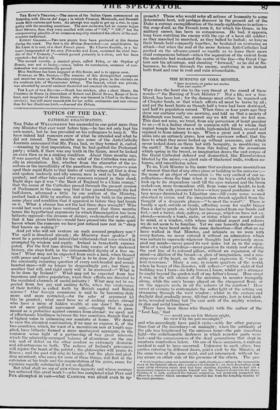TOPICS OF THE DAY.
CATHOLIC EMANCIPATION.
THE Duke of WELLINGTON has succeeded in one point more than any Minister that ever went before him,—he has not only kept his own secret, but he has prevailed on his colleagues to keep it. We have indeed had rumours enow of what he intended and what he did not intend. Three months ago some of the Anti-Catholic Journals announced that Mr. PEEL had, as they termed it, ratted, —meaning by that imputation, that he had 'quitted the Protestant party; which, if there was any truth in the figure, must be looked on even then as in a sinking condition. About three months ago, it was asserted that a bill for the relief of the Catholics was actually in circulation. But, whether from the character of the assertors or the incredibility of the assertions these, Of= crSEVEY7a soon sped their rapid flight to that limbo of vanity where all that is done and spoken uselessly and idly among men is said to be finally reposited ; and other tales and other rumours reigned in their stead. Eight days ago it was "the Bank of England to a China orange," that the cause of the Catholics passed through the present session of Parliament in the same way that it has passed through the last half-dozen, advanced a little by one portion of the Ministry, pushed back a little by another, and quitted by both in the precise same place and condition that it appeared in before they laid hands on it. What a change has not the last three days wrought ! Who would last week even have ventured to assert that three months hence the hypothetical arguments by which Emancipation has been hitherto opposed—the dreams of danger, ecclesiastical or political, that it has given birth to—would have passed into the same quiet haven where the rumours we have just noticed now rest in "sleep that knows no waking ?"
And yet who will not venture on such assured prophecy now? The spell is dissolved already ; the Ministry have spoken ! It must be a powerful spell indeed that withstands that voice when it is prompted by wisdom and equity. Ireland is henceforth emancipated. For the first time during the long course of her darkened history, she steps forth in the untrammelled dignity of a free nation! What may not be expected from such a land, when blessed with peace and equal laws? "What is to be done for Ireland ?" the constantly recurring question of every cool-headed and soundhearted man—will no longer be despondingly put; but there is another that will, and right early will it be answered—" What is to be done by Ireland?" What may not be expected from her ingenious and active population, when their efforts are directed to the regulated channels of useful industry ? What may not be expected from her gay and smiling fields, when the exuberance of their fertility is called forth by British capital and British science ? Our foreign commerce is said to be becoming daily more and more restricted,—for the sake of argument let this be granted; what need have we of seeking riches abroad who have a mine of hidden wealth at our door ? We speak not of mere political agreement only,—though that is paramount as a protective against enemies from abroad: we speak not of affectionate kindliness between the two countries, though that is of highest value in enhancing our comforts at home. We desire to view the chemical combination, if we may so express it, of the two countries, which, for want of a menstruum now at length supplied, have hitherto formed a mere mechanical aggregate, in the common sense light of a partnership of two great interests which the admirably-arranged balance of abundance on the one side and of defect on the other renders so extremely desirable and advantageous to both. The redress of Ireland's grievances will rejoice the heart of the patriot ; the philosopher will praise its fitness ; and the poet will sing its beauty : but the plain and plodding merchant, who cares for none of these things, will find in the extension of Ins trade and the augmentation of his gains, cause for rejoicing equally substantial if not so dignified. But what shall we say of Hiatt whose sagacity and whose courage has achieved this great work ?—who has completed what PITT and Fox attempted in vain—what CANNING was afraid even to ap
proach? Those who would refer all actions of humanity to some
determinate bent, will perhaps discover in the present act of the Duke a curious exemplification of the ready-sightedness inaction— the coup d mil, as the French term it, for which his Grace, in his military career, has been so conspicuous. He had, it appears, long been watching the enemy with the eye of a keen old soldier: as they marched he marched, as they halted he halted; so long as their bands held compactly together, he hesitated on venturing an attack—but when the zeal of the more furious Anti-Catholics had pushed on the advance-guard so rapidly as to leave their more staid companions behind—when the separation of the violent from the moderate had weakened the centre of the line—the Great Captain saw his advantage, and shouting "forward," as he did at Salamanca, he drove through the enemy, scattering in an instant both front and rear in rout and ruin irremediable.


















 Previous page
Previous page